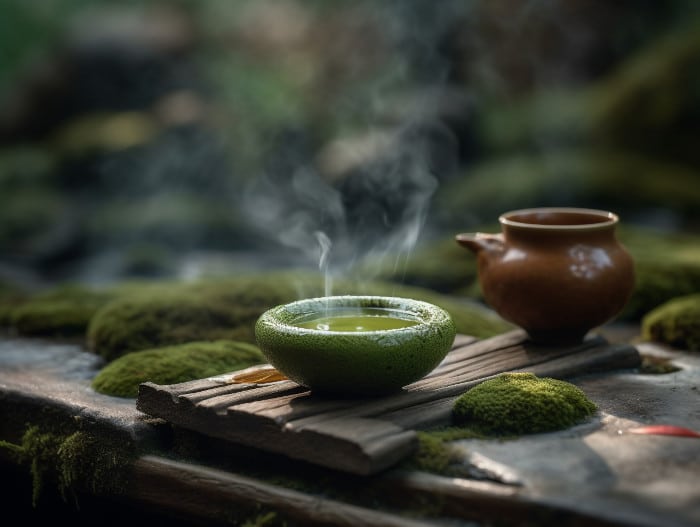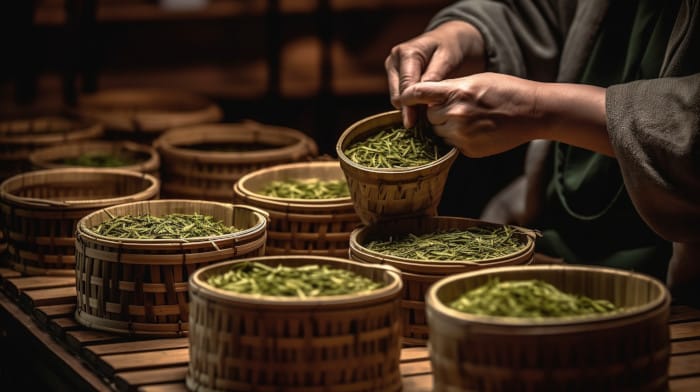Last Updated on July 7, 2024 by Max
Introduction
Maintaining health is paramount for overall well-being and quality of life. Searching for natural remedies and preventive strategies is a never-ending journey in health and wellness. One ancient brew consistently rises to the top as we navigate through myriad options – Green Tea. Revered in cultures around the globe and cherished by health specialists, this humble beverage is loaded with potent antioxidants and nutrients, offering a range of health benefits.
Today, we focus on a topic of increasing relevance for men worldwide – prostate health. The prostate, a small but crucial gland in men’s reproductive system, is often a source of significant health concerns as men age. A compelling story unfolds at the crossroads of these two powerful health narratives. What if the regular consumption of Green Tea could be a game-changer for prostate health? This post delves deep into the science, the practicalities, and the nuances of how Green Tea could be your secret weapon in the quest for optimal prostate health. So, whether you’re an avid tea drinker or merely interested in improving health, stay tuned as we brew up a storm of information in “Brewing Up Prostate Health: The Green Tea Guide Every Man Needs.”
The Antioxidant Advantage: The Role of Antioxidants in Prostate Health
In the bustling city of cells that is our body, antioxidants are the unsung heroes, the firefighters quenching the flames of cell damage. What are these antioxidants, and how do they connect to prostate health?
Antioxidants inhibit oxidation, a chemical reaction that can produce free radicals, leading to chain reactions that may damage cells (Halliwell, B., 1996). Our bodies naturally produce some antioxidants, but we can and should supplement this through our diets. Enter the realm of fruits, vegetables, and, yes, Green Tea – nature’s treasure troves of these vital compounds.
But why should men be specifically concerned about antioxidants for prostate health? The answer lies in the nature of the prostate itself. This small, walnut-sized gland just below the bladder is highly susceptible to oxidative stress and inflammation (Sfanos, K. S., De Marzo, A. M., 2012). Over time, these conditions can contribute to common prostate issues like prostatitis, benign prostatic hyperplasia (BPH), and even prostate cancer.
The good news? Antioxidants are adept at neutralizing free radicals, reducing oxidative stress, and potentially curbing inflammation – all factors that can be instrumental in maintaining a healthy prostate (Pall, M.L., Levine, S., 2015). They are the gatekeepers, the guardians of cellular health, and including them in your diet can be a strategic move in the game of health and well-being.
So, the next question becomes: how can we effectively harness the antioxidant power in our diets? That’s where Green Tea comes in. But before we dive into the cup of this beneficial brew, let’s take a brief detour to explore its history and origin.
Stay tuned because the story of Green Tea is as fascinating as its health benefits!
The Power of Green Tea
Since immemorial, Green Tea has been a staple in many cultures, particularly in Asia. The discovery of Tea is steeped in legend, tracing back to the Chinese emperor Shen Nung around 2737 B.C. When a wild tea bush leaf fell into his pot of boiling water, he was intrigued by the aroma and decided to taste the infusion. And just like that, the world’s love affair with Tea began.

Fast forward to today, and Green Tea has become a global sensation for its refreshing taste and wealth of health benefits. Unlike its black or oolong counterparts, Green Tea is made from Camellia sinensis leaves and buds that have not undergone the same withering and oxidation process (Graham, H.N., 1992). This minimal processing allows green Tea to retain a high concentration of antioxidants and beneficial polyphenols.
The most significant of these polyphenols are catechins, making up about 30% of the dry weight of green tea leaves (Yang, C.S., Landau, J.M., Huang, M.T., Newmark, H.L., 2001). These catechins include epicatechin (E.C.), epicatechin-3-gallate (ECG), epigallocatechin (EGC), and the most abundant and bioactive component, epigallocatechin-3-gallate (EGCG).
This composition makes green Tea one of our diet’s richest sources of antioxidants. But how much green Tea is necessary to reap its benefits? Here’s where it gets tricky.
The amount of catechins, particularly EGCG, can vary significantly between green tea types and brewing methods. However, a typical serving of green Tea (one cup or 240 ml) can contain between 50 to 100 mg of EGCG (Chow, H.H.S., Cai, Y., Hakim, I.A., Crowell, J.A., Shahi, F., Brooks, C.A., Dorr, R.T., Hara, Y., Alberts, D.S., 2003).
While there isn’t a defined daily requirement for EGCG or other catechins, several studies suggest that consuming between 200 to 300 mg of EGCG daily could offer substantial health benefits (Chow, H.H.S., Hakim, I.A., 2011). This translates to about 2-3 cups of green Tea daily, considering an average EGCG content.
However, it’s important to note that our bodies don’t absorb all the catechins we ingest; much depends on individual health and metabolism. Also, while green Tea is a wonderful source of antioxidants, it’s best to consume it as part of a balanced diet rich in various antioxidants.
With this understanding of the power of green Tea, it’s time to dive into the heart of the matter: what does science say about green Tea and prostate health? Is there evidence to support the claims? Stay with us as we explore this intriguing topic next!
Green Tea and Prostate Health: What Does Science Say?
Now that we have established the antioxidant-rich nature of Green Tea, it’s time to explore the crux of our discussion: What does scientific research say about the relationship between green Tea and prostate health?
Several research studies have examined this topic, and many suggest a positive correlation. The study published in the American Journal of Epidemiology in 2008 was a large prospective cohort study involving 49,920 men aged 40–69 years in Japan, a country where green tea consumption is widespread (Kurahashi, N., Sasazuki, S., Iwasaki, M., Inoue, M., Tsugane, S., 2008). During an average follow-up period of 11 years, the researchers found that men who consumed five or more cups of Green Tea daily had a 48% lower risk of developing advanced prostate cancer than men who consumed less than a cup per day. However, green tea consumption was not associated with localized prostate cancer.
The other study published in Cancer Research in 2006 involved 60 men with high-grade prostate intraepithelial neoplasia, a precursor to prostate cancer (Bettuzzi, S., Brausi, M., Rizzi, F., Castagnetti, G., Peracchia, G., Corti, A., 2006). The men were randomized to receive either 600 mg of green tea catechins (50% were EGCG) or a placebo daily for one year. At the end of the study, only one man in the green tea group developed prostate cancer (3%), compared to nine men in the placebo group (30%).
A review study published in 2013 in the journal “Epigenomics” analyzed multiple studies on green tea catechins and prostate cancer (Henning, S.M., Wang, P., Carpenter, C.L., Heber, D., 2013). The review concluded that green tea catechins, specifically EGCG, could affect multiple signaling pathways and molecular targets in both cancer cells and surrounding cells in the tumor microenvironment, which could inhibit the growth and progression of prostate cancer.
While these studies are promising, it is essential to understand that they do not definitively prove that green Tea alone can prevent or treat prostate issues. However, they do suggest that the antioxidants in Green Tea, specifically EGCG, could contribute to prostate health by reducing inflammation, neutralizing harmful free radicals, and potentially inhibiting the growth of cancer cells (Henning, S.M., Wang, P., Carpenter, C.L., Heber, D., 2013).
These findings underscore the potential benefits of incorporating green Tea into a comprehensive approach to prostate health.
As we’ve discovered the potential health benefits of Green Tea, how can we weave this antioxidant powerhouse into our daily diets effectively? Stay tuned as we brew up some practical tips and considerations next.
Incorporating Green Tea into Your Diet
Understanding how to incorporate green Tea into your daily routine effectively and safely is crucial. Here are a few practical tips and considerations:
1. Substitute for other beverages: Consider replacing your second cup of coffee or a sugary soda with a refreshing cup of green Tea. It provides hydration and a host of antioxidants, making it a healthier option.
2. Brew it right: The brewing process dramatically affects the level of antioxidants in your Tea. Avoid using boiling water, as it can destroy some of the catechins. Bring the water to a boil, let it rest for ten minutes, then pour it over the Tea. Allow the Tea to steep for one to two minutes to extract a good balance of the catechins.
3. Explore green tea variants: From bagged and loose-leaf Tea to matcha powder, green Tea comes in several forms. Trying different varieties can add an element of novelty to your routine.
4. Think about timing: To optimize nutrient absorption, it’s generally best to drink Green Tea between meals rather than with meals. This is because the tannins in green Tea can inhibit the absorption of certain nutrients, such as iron (Zijp, I.M., Korver, O., Tijburg, L.B., 2000). Also, to avoid potential sleep disturbances due to its caffeine content, try to enjoy your Green Tea early in the day or at least several hours before bedtime.
5. Don’t rely solely on Green Tea: While it offers many health benefits, it should not be your only source of hydration or nutrition. A balanced diet rich in various fruits, vegetables, lean proteins, and whole grains, combined with regular exercise, is the cornerstone of good health.
Green Tea contains caffeine — about 35-70 mg per 8 ounces, depending on brewing time and tea quality (Mayo Clinic, 2020). For some individuals, particularly those sensitive to caffeine, this could lead to sleep problems, jitteriness, or a fast heartbeat. It may also cause stomach upset or constipation in some people.
If you’re planning to consume a significant amount of green Tea, it’s wise to consult with your healthcare provider first. They can consider your overall health status, existing conditions, and other medications or supplements you’re taking.
Now that you’re equipped with tips to incorporate green Tea into your daily routine let’s dive into the world of green tea varieties to choose the right one for you.
Choosing the Right Green Tea
Now that you’re ready to embrace the power of green Tea for prostate health, choosing the right type is essential. Green Tea has many varieties, each with unique characteristics, flavors, and potential health benefits. The chemical composition of Green Tea can vary greatly depending on multiple factors, including the type of Tea, the soil and climate where it’s grown, and how it’s processed and brewed.

It’s generally accepted that all varieties of high-quality Green Tea can be excellent sources of antioxidants, including catechins like EGCG. Here are a few types of green Tea to consider:
| Sencha | This is the most common Japanese green Tea. It has a balanced flavor profile, a mix of sweet and bitter, making it a great everyday tea. |
| Matcha | This is a powdered form of green Tea that’s rich in antioxidants. Unlike other green teas, you consume the entire leaf when you drink matcha, which can increase the health benefits. However, because of its concentrated nature, it also contains more caffeine. |
| Gunpowder | This Chinese green Tea is rolled into small, round pellets resembling gunpowder. It’s known for its bold, slightly smoky flavor. |
| Gyokuro | Gyokuro is a high-quality Japanese green tea. It’s grown under shade for about three weeks before harvest, which increases its chlorophyll content and gives it a rich, full-bodied flavor. |
| Longjing (Dragon Well) | This is one of China’s most famous green teas. It’s known for its delicate flavor, jade green color, and the unique flat shape of the leaves. |
This is one of China’s most famous green teas. It’s known for its delicate flavor, jade green color, and the unique flat shape of the leaves.
When choosing your green Tea, look for high-quality products. Check the ingredients to ensure there are no added sugars or artificial flavors. Organic green Tea is often a good choice, as it’s grown without synthetic fertilizers and pesticides.
Lastly, remember that you enjoy drinking the best green tea. Experiment with different types until you find the ones that suit your taste.
Are you ready to brew the perfect cup of green Tea? Let’s move on to the next section.
Brewing the Perfect Cup of Green Tea
Now that you’ve chosen your preferred green tea variety, it’s time to brew. The brewing process plays a crucial role in extracting the beneficial compounds from the tea leaves. Here’s a step-by-step guide to brewing the perfect cup of green Tea:
1. Measure the Tea: Start with one teaspoon of loose-leaf tea or one tea bag per cup.
2. Heat the water: Green Tea requires a lower temperature than black or oolong Tea. Aim for a water temperature of 160-180°F (70-80°C). If you don’t have a thermometer, a good rule of thumb is to boil the water and let it cool down for about ten minutes.

3. Steep the Tea: Pour the hot water over the tea leaves or tea bag. Allow the Tea to steep for 1-3 minutes. A shorter steeping time will result in a milder flavor, while a longer steep will yield a stronger tea. Be aware that steeping for too long can also result in bitterness.
4. Enjoy as is, or add extras: Green Tea is traditionally enjoyed plain. Avoid sugar or milk as they can overpower the delicate flavor of the Tea and potentially inhibit the absorption of some of its antioxidants. However, add a squeeze of lemon (which can boost the Tea’s antioxidant power) or a small spoonful of honey.
5. Experiment and adjust: Feel free to adjust the amount of Tea, water temperature, and steeping time to find the combination that produces a cup of tea you enjoy. The perfect cup of Tea is primarily a matter of personal preference.
And there you have it! With these tips, you’re ready to brew delicious green tea packed with health benefits.
Conclusion
Embarking towards optimal health can often feel overwhelming with much information and choices. However, sometimes the answer lies in simple, time-honored practices – like sipping on a soothing cup of green Tea.
From its antioxidant-rich composition to the promising research on its benefits for prostate health, green Tea stands as a testament to the power of nature in supporting our well-being. It’s a potent brew with a rich history, diverse varieties, and many health benefits, making it a worthy addition to any diet.
However, while Green Tea can contribute to a healthy lifestyle, it’s not a cure-all. A holistic approach to prostate health involves regular check-ups, a balanced diet, exercise, and lifestyle modifications. Green Tea is a fantastic addition but not a substitute for professional medical advice and treatment.
With this comprehensive guide, we hope we’ve empowered you with the knowledge and practical tips to make green Tea a part of your routine. So, why not start today? Brew your first cup of green Tea, and here’s to your health!
We would love to hear about your experiences with green Tea. Have you noticed any changes in your health since you started drinking it? Share your thoughts in the comments section below.
Thank you for joining us on this journey of exploration into the intersection of green Tea and prostate health. Remember, every small step you take toward your health can make a big difference.
References
- Halliwell, B. (1996). Antioxidants in human health and disease.
- Sfanos, K. S., De Marzo, A. M. (2012). Prostate cancer and inflammation: the evidence.
- Pall, M.L., Levine, S. (2015). Oxidative stress in prostate hyperplasia and carcinogenesis.
- Graham, H.N. (1992). Green tea composition, consumption, and polyphenol chemistry.
- Khan, N., Mukhtar, H. (2007). Tea polyphenols for health promotion.
- Tipoe, G.L., Leung, T.M., Hung, M.W., Fung, M.L. (2007). Green tea polyphenols as an antioxidant and anti-inflammatory agent for cardiovascular protection.
- Yang, C.S., Landau, J.M., Huang, M.T., Newmark, H.L. (2001). Inhibition of carcinogenesis by dietary polyphenolic compounds.
- Chow, H.H.S., Cai, Y., Hakim, I.A., Crowell, J.A., Shahi, F., Brooks, C.A., Dorr, R.T., Hara, Y., Alberts, D.S. (2003). Pharmacokinetics and safety of green tea polyphenols after multiple-dose administration of epigallocatechin gallate and polyphenon E in healthy individuals.
- Chow, H.H.S., Hakim, I.A. (2011). Pharmacokinetic and chemoprevention studies on Tea in humans.
- Kurahashi, N., Sasazuki, S., Iwasaki, M., Inoue, M., Tsugane, S., (2008). Green tea consumption and prostate cancer risk in Japanese men.
- Bettuzzi, S., Brausi, M., Rizzi, F., Castagnetti, G., Peracchia, G., Corti, A., (2006). Chemoprevention of human prostate cancer by oral administration of green tea catechins.
- Henning, S.M., Wang, P., Carpenter, C.L., Heber, D., (2013). Epigenetic effects of green tea polyphenols in cancer.
- Zijp, I.M., Korver, O., Tijburg, L.B. (2000). Effect of Tea and other dietary factors on iron absorption.
- Mayo Clinic. (2020). Caffeine content for coffee, Tea, soda, and more.

This is just what I needed to read at this stage in life. I’m just beginning to have problems with the ever-expanding prostate and have been trying to find some suitable, natural way to treat this issue that I can live with. I do enjoy drinking green tea, but I don’t consume it nearly enough. If I’d known it was that good for prostate health, I’d have made it a regular part of my daily routine by now. Thanks so much for sharing this! I’ll be sure to pass it on to other friends of mine that I know are having issues with their prostates.
Mark
Hey Mark! ?
I’m really glad you found the post helpful! It’s never too late to start good habits, and it sounds like incorporating more green tea into your routine could be a great natural step for you. It’s all about finding what works best for your body and lifestyle.
Remember, it’s not just about quantity but also about enjoying the process. Maybe explore different varieties of green tea and find the ones you love the most.
Wishing you and your friends all the best on your journey to better prostate health! And keep stopping by, there’s always more to learn and share.
Cheers to a healthier, tea-filled life! ?
Max